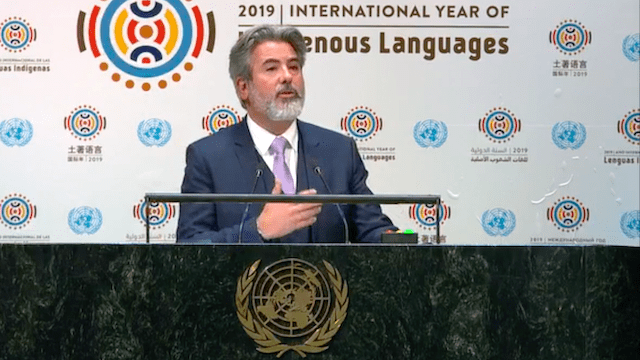
Canadian Heritage Minister Pablo Rodriguez spoke at the U.N. General Assembly in New York Friday to mark the launch of the International Year of Indigenous Languages. Photo: United Nations.
Martha TroianAPTN NewsThe highly anticipated Indigenous Languages bill will be introduced early next week.On Friday the Liberals tabled a notice to introduce the long-anticipated legislation, titled An Act Respecting Indigenous Languages.The news comes as Heritage Minister Pablo Rodriguez, Assembly of First Nations National Chief Perry Bellegarde, Inuit Tapiriit Kanatami (ITK) President Natan Obed and Metis National Council President Clement Chartier are in New York to mark the United Nations General Assembly launch of the International Year of Indigenous Languages.“Reclamation, revitalization, strengthening and maintenance of Indigenous languages are essential components of reconciliation, and there is no better time to focus on this important issue than during this special year,” Rodriguez said in a statement Friday.Rodriguez has not revealed what the bill will entail, but Indigenous leaders have said it must be sufficient in providing the tools and resources necessary to strengthen the status of the dozens of languages at risk of being lost.On Friday, Bellegarde told the U.N. General Assembly that First Nations “need legislation to ensure sufficient, sustainable and long-term funding toward the revitalization of our languages.“We need schools on-reserve as well as in urban and rural settings to create and implement effective bilingual and immersion education programs beginning with pre-school age children,” he said.“And we need programs that inspire all of our people to speak our languages, regardless of age, to renew the vibrancy of our communities as our cultural places.“We want our languages to be our living languages — sourced from our lands, expressing our creation stories, and alive in our ceremonies and daily lives.”On Friday, the ITK and leaders from the four Inuit regions reiterated that their support for the legislation is “contingent on the expectation that any bill would be distinctions-based and include substantive Inuktut-specific provisions that build on existing rights for Inuktut.“We continue to engage with the Government of Canada in an effort to ensure that the bill meets this expectation,” the joint media release said.Prime Minister Justin Trudeau promised in December 2016 that his government would enact legislation on First Nations, Inuit and Métis languages, developed in cooperation with Indigenous peoples.In a statement to APTN News Thursday, the department said the bill will mark “the first time in our history that a partnership centred on co-development with Indigenous peoples has taken place.“It is important to move forward quickly and together, that’s why we have already invested a historic $90 million for Indigenous Languages initiatives. We will soon be tabling the legislation, because this is an essential step towards reconciliation.”According to the government the 12 principles to inform the bill’s content was co-developed with Indigenous groups, and more than 50 “collaborative engagement sessions” were held “to collect elements of importance to be included in the legislation.”The United Nations Educational, Scientific and Cultural Organization (UNESCO) has designated three quarters of Canada’s approximately 90 living Indigenous languages as “endangered,” a government news release said Friday.UNESCO also found that there are no Indigenous languages in the “safe” category.“In 2016, only 15.6 percent of Indigenous people could converse in an Indigenous language, compared to 17 percent in 2011 and 21 percent in 2006. Of those overall numbers, 21 percent of First Nations people, 64 percent of Inuit and 2 percent of Métis could converse in an Indigenous language,” the government’s release said.Article 13 of the United Nations Declaration on the Rights of Indigenous Peoples says Indigenous peoples “have the right to revitalize, use, develop and transmit to future generations their histories, languages, oral traditions, philosophies, writing systems and literatures, and to designate and retain their own names for communities, places and persons.”The Truth and Reconciliation Commission’s calls to action compelled the federal government to enact federal legislation that incorporates specific principles, and “to acknowledge that Aboriginal rights include Aboriginal language rights.”mtroian.ca









